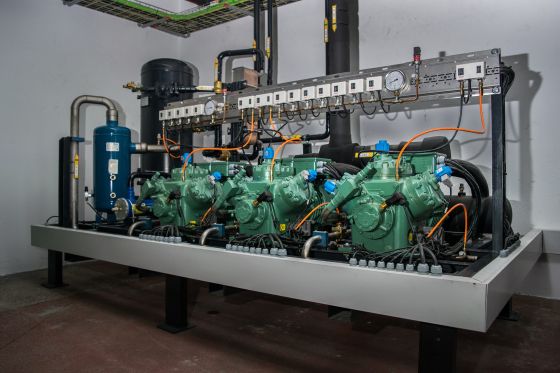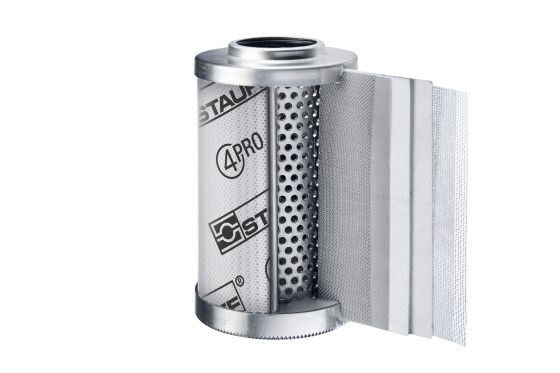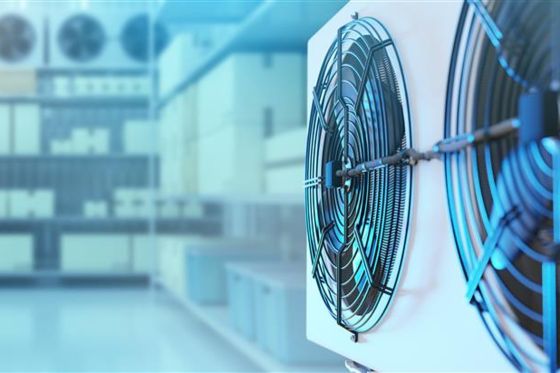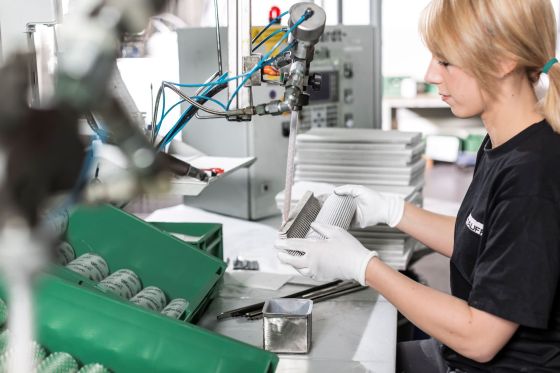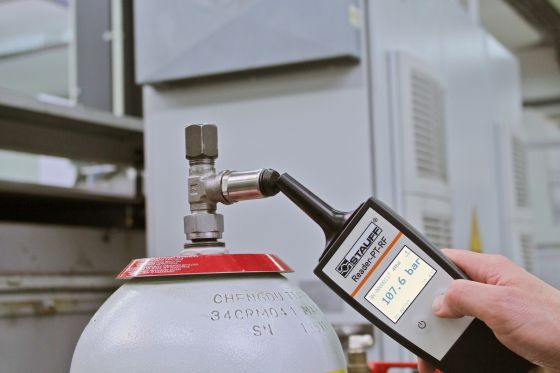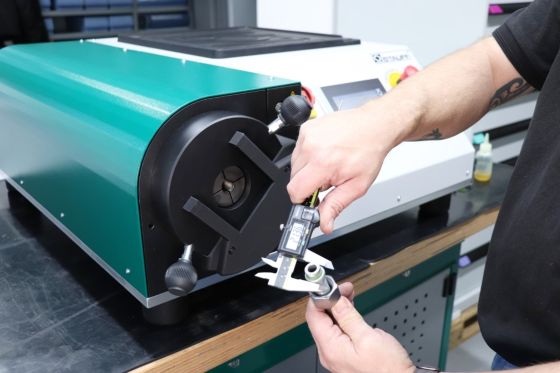Table of contents
- What operators of industrial refrigeration systems should know about ammonia
- Why standard filter elements can fail
- Risks for system operators: What is really at stake in the event of filter failure
- How ammonia-resistant filter elements from STAUFF solve the problem
- Which systems the STAUFF solution is particularly suitable for
- Why STAUFF is the right partner for your filter technology
- FAQs
What operators of industrial refrigeration systems should know about ammonia
Ammonia (NH₃), also known as R717, has been established as a particularly efficient and environmentally friendly refrigerant in industrial refrigeration systems for decades. It boasts outstanding thermodynamic properties, produces no CO₂ equivalent and scores highly in terms of energy efficiency - a clear advantage in times of rising energy prices and increasing sustainability requirements.
Its use is primarily focussed on power-intensive applications, such as
Large cold stores and freezers
Food processing, e.g. slaughterhouses, dairies, breweries
Chemical and pharmaceutical industry
Plastics processing and other industrial processes with high heat loads
However, for all its benefits, ammonia also poses technical challenges - especially when interacting with lubricating oil and sensitive system components. In practice, it has been shown time and again that even the smallest amounts of NH₃ that unintentionally enter the lubricating oil system can cause damage - with potentially high costs due to maintenance, repairs or even system downtime.
Filter technology is a particularly critical weak point here. Filter elements, which are actually intended to protect the compressor, often fail if they are not specially designed for the properties of ammonia. This is precisely where this article comes in.
We show why standard solutions are not sufficient in NH₃ applications, what damage is at risk - and how STAUFF offers a reliable solution with specially developed, ammonia-resistant filter elements.
Why standard filter elements can fail
In normal operation, the refrigerant - i.e. the ammonia - should not come into contact with the lubricating oil. In the case of screw compressors, which are used particularly frequently in industrial refrigeration systems, this is unavoidable by design.
Gaseous ammonia can diffuse into the oil system through the smallest leaks or gaps in the micrometre range. And this is where the problem begins.
Many conventional filter elements are not designed for this contact. The weak points:
Adhesives: Standard adhesives for connecting filter components such as the support tube, bellows and end cap react sensitively to ammonia - they swell, become brittle or dissolve.
Seals: Common sealing materials may also not be resistant to NH₃ and lose their function
The consequences are dramatic:
Filters lose their function
Particles enter the oil or lubrication circuit system unhindered
Risk of mechanical damage to the compressor
The lubricating oil itself becomes contaminated and must be replaced
In the worst case, the entire system must be flushed and refilled
Risks for system operators: What is really at stake in the event of filter failure
A defective filter element not only causes increased maintenance costs - it can become a real cost and safety risk. The most common consequences at a glance:
Direct effects:
Premature replacement of filter elements and oil
Downtimes due to repair and system flushing
Damage to compressors and other components
Indirect (but expensive) consequences:
Production losses
Loss of quality with temperature-sensitive products
Impairment of system availability
Loss of image in the event of delivery delays
Those who rely on standard filters in NH₃ applications therefore risk far more than just a premature maintenance appointment.
How ammonia-resistant filter elements from STAUFF solve the problem
As a specialist in filtration technology, STAUFF has a clear goal: to reliably protect system operators from precisely these risks. Our solution: filter elements that have been specially developed for use in NH₃ refrigeration systems.
What makes STAUFF filter elements special:
Ammonia-resistant adhesives: All connections in the filter element are made with specially developed adhesives that are resistant to ammonia.
Suitable sealing materials: The seals used remain stable and functional for a long time, even when in contact with NH₃.
Quality from our own production: Production takes place entirely at the Werdohl site (Germany) - with the highest standards in cutting, folding, assembly and quality assurance.
Precisely fitting replicas: More than 10,000 filter types can be reproduced on request to match the original in terms of installation and function - also in ammonia-resistant versions if required.
The result is a solution that is precisely tailored to the requirements of your application - with maximum operational reliability.
For which systems the STAUFF solution is particularly suitable
STAUFF ammonia-resistant filter elements are used wherever ammonia is used as a refrigerant and maximum operational reliability is required.
Typical fields of application:
Industrial slaughterhouses (cold rooms, cutting areas, blast freezers)
Milk and dairy plants (process cooling, storage, fermentation)
Fish processing (cold chains, ice production)
Beverage producers (fermentation, storage)
Pharmaceutical and chemical industry (process cooling, storage)
Plastics industry (temperature control during moulding)
Other industries with temperature-controlled processes and high cooling requirements
Our filters are particularly suitable for screw compressors from well-known manufacturers - such as Bitzer (e.g. ACP.85 / ACP.95) or comparable compressor packs.
Why STAUFF is the right partner for your filter technology
As one of the leading manufacturers of replacement filter elements for hydraulic and lubricating oil systems, STAUFF not only offers experience - but above all customised solutions.
Your advantages with STAUFF:
In-house production - even in small quantities
Stocking of customised elements for maximum availability
Quality assurance to the highest standards
Technical advice from experienced specialists
Delivery of customised replacement filters - fast, reliable and worldwide
If you want to operate your refrigeration system safely and sustainably, our ammonia-resistant filter elements are the right choice.
Further information about our filters
Have you always wanted to know how and where our filter elements are manufactured? In this article, we give you an exclusive insight:
FAQs
What happens when standard filter elements come into contact with ammonia?
How can ammonia even get into the lubricating oil?
Despite constructive separation, NH₃ can diffuse into the oil system via microscopically small gaps or leaks.
Are ammonia-resistant filter elements more expensive?
Yes - but they are an investment in operational safety. Compared to repair and downtime costs, the additional expense is significantly lower.
Can STAUFF filter elements be integrated into existing systems?
Absolutely. STAUFF offers customised replicas for over 10,000 filter types - functionally and qualitatively equivalent to or better than the original.
How quickly can ammonia-resistant filters be supplied?
Depending on the type and quantity, often at short notice - especially if a customised stock level has been agreed with STAUFF.

Newsletter registration
Subscribe to the newsletter now and don't miss any new articles!

